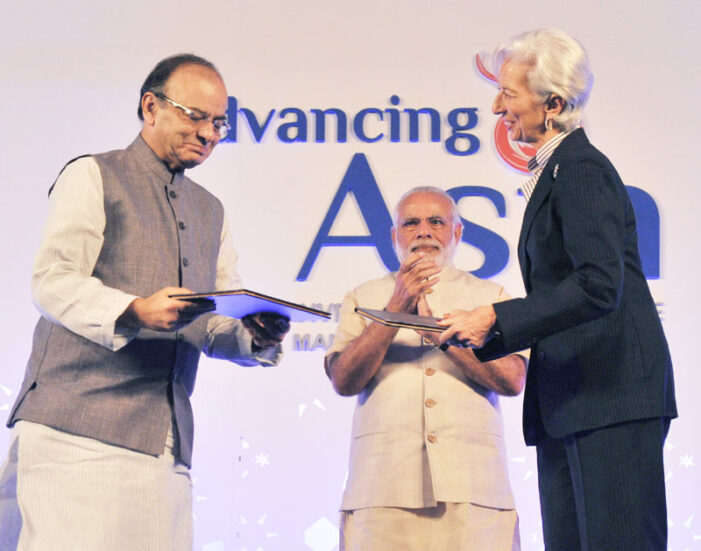Addressing the IMF conference in New Delhi, Prime Minister Narendra Modi said Asian people save more traditionally compared to other parts of the world and the future of world economy belongs to them as they have surplus to invest in rejuvenating the global economy, though IMF quotas do not reflect the global economic realities.
Change in quotas is an issue of fairness and legitimacy and is essential for poor nations to respect the legitimacy of such institutions, he saaid welcoming IMF decision to finalize the next round of quota changes by October 2017.
Recalling India’s representative to the Bretton Woods Conference in 1944, which gave birth to the IMF, he said India’s delegate Mr. R.K. Shanmukham Chetty, who later became independent India’s first Finance Minister, paved the way for India’s contribution to world institutions and India has kept its contribution high by becoming a founding member of the Asian Infrastructure Investment Bank and the New Development Bank.
The PM has also announced a new partnership with Bangladesh, Bhutan, Maldives, Nepal, Sri Lanka, India and the IMF to set up the South Asia Regional Training and Technical Assistance Centre to provide training to government and public sector employees as a part of capacity building process in the region.

“Many knowledgeable people have said that the twenty first century is, and will be, the Asian Century,” he said citing figures that three out of every five people in the world live in Asia and its share in global output and trade is now close to one-third. Its share in global foreign direct investment is about 40%, he noted.
Stressing the theme of the conference which is ‘Investing for the Future’, he said, “Asians tend to save to buy a house, rather than borrow to buy a house.”
Pointing out another unique feature of Asia which is its large number of women leaders, he said India, Sri Lanka, Bangladesh, Pakistan, Indonesia, Thailand, Korea, Myanmar, and Philippines have had women as national leaders. “Today, four large states of India – West Bengal, Tamil Nadu, Gujarat and Rajasthan – are headed by democratically elected women. The Speaker of the Lower House of Parliament in India is also a woman,” he said.
Despite a second successive year of weak rainfall, India has increased its growth rate to 7.6 per cent, the highest among major economies in the world, he said.
He pondered on some positive policies of India:
We undertook a highly successful financial inclusion programme, bringing over two hundred million unbanked people into the banking system within a span of a few months.
* Thanks to our financial inclusion programme, we now have the world’s largest and most successful programme of direct benefit transfers, in cooking gas. We plan to extend it to other sectors such as food, kerosene, and fertilizers. This has improved targeting and the quality of public expenditure.
* We have opened up nearly all sectors of our economy to FDI.
* India achieved the highest ever rank in the World Bank Doing Business indicators in 2015.
* India reached an all-time high in many physical indicators in 2015, including
* The production of coal, electricity, urea, fertilizer and motor vehicles;
* Cargo handled at major ports and the fastest turnaround time in ports;
* Award of new highway kilometers;
* Software export;
* Entrepreneurship is booming.
“India is now fourth in the world in the number of technical start-ups, after USA, Britain and Israel. The Economist magazine has called India the new frontier for E-Commerce… We aim to double farmer incomes by:
• increasing irrigation,
• better water management,
• creating rural assets
• boosting productivity,
• improving marketing,
• reducing margins of middlemen and
• avoiding income shocks.”
“My dream is of a Transformed India. I lay this dream alongside our common dream of an Advanced Asia – an Asia where more than half of the global population can live with happiness and fulfillment. Our joint heritage and mutual respect, our common goals and similar policies, can and must create sustainable growth and shared prosperity,” he said.

